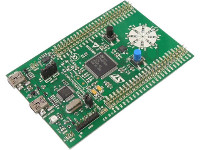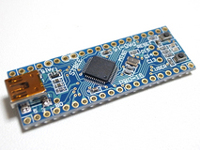First, you have to know there are several boards supported by the demo. Second, the demo needs Ajhc 0.8.0.7 or later.
Using following boards are strongly recommend, so you can use gdb.
- stm32f3-discovery
- mbed NXP LPC1768
- Haskell code uses Haskell heap on Cortex-M4. - YouTube
- Haskell code is running on Cortex-M3! - YouTube
- Don't stop me now! #Ajhc #Haskell #Heap #CortexM4 #STM32 - YouTube
- CPU: STM32F303VCT6
- ROM: 256kB
- RAM: 48kB
- CPU: LPC1768
- ROM: 512kB
- RAM: 32kB
- CPU: LPC1769
- ROM: 512kB
- RAM: 64kB
- CPU: STM32F103CBT6
- ROM: 128kB
- RAM: 20kB
$ git clone https://github.com/vedderb/summon-arm-toolchain.git
$ apt-get install flex bison libgmp3-dev libmpfr-dev libncurses5-dev \
libmpc-dev autoconf texinfo build-essential libftdi-dev zlib1g-dev \
git zlib1g-dev python-yaml
$ cd summon-arm-toolchain/
$ ./summon-arm-toolchain
$ export PATH=$HOME/sat/bin:$PATH
$ sudo apt-get install make locales autoconf libreadline-dev \
libwww-perl libconfig-yaml-perl graphviz haskell-platform drift pandoc \
libghc-readline-dev libghc-utf8-string-dev libghc-hssyck-dev libghc-pandoc-dev
$ git clone https://github.com/ajhc/ajhc.git
$ cd ajhc
$ git checkout arafura
$ autoreconf -i
$ ./configure
$ make
$ sudo make install
$ ajhc --version |head -1
ajhc 0.8.0.1 (-0)
$ sudo apt-get install libsgutils2-dev libusb-1.0-0-dev
$ git clone https://github.com/texane/stlink.git
$ cd stlink/
$ ./autogen.sh
$ ./configure
$ make
$ sudo make install
$ git clone https://github.com/ajhc/demo-cortex-m3
$ cd demo-cortex-m3/stm32f3-discovery/
$ make
In one terminal, start the connection to the board.
$ sudo st-util
In another terminal, connect to the debugger and flash program.
$ make gdbwrite
--snip--
Loading section .isr_vector, size 0x188 lma 0x8000000
Loading section .text, size 0x1ec4 lma 0x8000188
Loading section .data, size 0x5c lma 0x800204c
Start address 0x8001f89, load size 8360
Transfer rate: 6 KB/sec, 2786 bytes/write.
(gdb) c
http://mbed.org/handbook/Firmware-LPC1768-LPC11U24
Use rev 141212 or later firmware, to support CMSIS-DAP.
http://mbed.org/blog/entry/Debugging-from-GDB-using-pyOCD/
$ sudo apt-get install python libusb-1.0-0-dev
$ git clone https://github.com/walac/pyusb.git
$ cd pyusb
$ sudo python setup.py install
$ git clone https://github.com/mbedmicro/pyOCD.git
$ cd pyOCD
$ sudo python setup.py install
$ cd demo-cortex-m3/mbed-nxp-lpc1768
$ cd samples/Haskell
$ make
In one terminal, start the connection to the board.
$ cd demo-cortex-m3/mbed-nxp-lpc1768
$ sudo python gdbserver4mbed.py
In another terminal, connect to the debugger and flash program.
$ cd demo-cortex-m3/mbed-nxp-lpc1768
$ ./BuildShell
$ cd samples/Haskell
$ make gdbwrite
(gdb) c
$ cd demo-cortex-m3/mbed-nxp-lpc1768
$ ./BuildShell
$ cd samples/Haskell
$ make gdbwrite
LPC-Link is not used with Linux Host. A debug board is needed for writing firmware to LPCXpresso Board. You can get more infomation from the following links.
$ svn co https://lpc21isp.svn.sourceforge.net/svnroot/lpc21isp
$ cd lpc21isp/
$ make
$ sudo cp lpc21isp /usr/local/bin/
$ git clone https://github.com/ajhc/demo-cortex-m3.git
$ cd demo-cortex-m3/lpcxpresso-lpc1769/blinky/
$ make
Connect up the LPCXpresso Board to PC with USB cable. Pull nReset low to put the LPC1769 into reset. Pull the ISP pin (P0.14) low. Pull nReset high, LPC1769 will be boot with ISP mode.
Then, flash program with below command.
$ make flash
Pull nReset low, and pull nReset high.
$ git clone git://gitorious.org/~tormod/unofficial-clones/dfuse-dfu-util.git
$ cd dfuse-dfu-util/
$ ./autogen.sh
$ ./configure
$ make
$ sudo make install
$ git clone https://github.com/ajhc/demo-cortex-m3.git
$ cd demo-cortex-m3/stbee-mini/
$ make
Press and release the reset switch while holding down the user switch. Then release the user switch. The hardware will boot with DFU download mode.
Run below command on Linux box to flash program.
$ make write2stbeemini
Press and release the reset switch to boot with normal mode.
C language code is needed to launch Haskell code. For example, https://github.com/jeremyherbert/stm32-templates.
$ mkdir hs_src
$ vi hs_src/Main.hs
Note that the below idiom is used to access Memory-mapped I/O.
$ vi hs_src/Main.hs
--snip--
foreign import ccall "c_extern.h &jhc_zeroAddress" c_jhc_zeroAddress32 :: Ptr Word32
myPtr :: Ptr Word32
myPtr = c_jhc_zeroAddress32 `plusPtr` myAddr
where myAddr = 0x48001028
writeMyPtr :: Word32 -> IO ()
writeMyPtr = poke myPtr
--snip--
$ vi c_extern.h
extern volatile void jhc_zeroAddress;
For example, demo-cortex-m3/stm32f3-discovery/hs_src/Main.hs.
$ vi src/main.c
int main(void) {
/* --snip-- */
{ /* Run Haskell code */
int hsargc = 1;
char *hsargv = "t";
char **hsargvp = &hsargv;
hs_init(&hsargc, &hsargvp);
_amain();
/* hs_exit(); */
}
/* --snip-- */
For example, demo-cortex-m3/stm32f3-discovery/src/main.c.
Some software architecture on tiny CPU often have no malloc function. But Ajhc's garbage collector (jgc) needs the malloc.
For example, demo-cortex-m3/stm32f3-discovery/src/alloc.c.
Implement the functions that are used by Ajhc's RTS.
For example, demo-cortex-m3/stm32f3-discovery/src/dummy4jhc.c.
Covert Haskell code to C language with Ajhc, and extract Ajhc's RTS source code on "jhc_custom/rts/src" directory.
$ vi Makefile
# --snip--
JHCRTS_LIB=jhc_custom/rts
JHCRTS_SRC=jhc_custom/rts/src
SRCS += hs_main.c alloc.c dummy4jhc.c
CFLAGS += -Wl,--defsym,jhc_zeroAddress=0
all: $(TARGET)
$(TARGET): $(SRCS) jhcrts
$(CC) $(CFLAGS) $(SRCS) -o $@ -L$(JHCRTS_LIB) -ljhcrts
jhcrts: hs_main.c
$(MAKE) -C $(JHCRTS_LIB)
hs_main.c: hs_src/Main.hs
ajhc -fffi --tdir=$(JHCRTS_SRC) -C -o $@ $<
# --snip--
For example, demo-cortex-m3/stm32f3-discovery/Makefile.
Create Makefile for compiling Ajhc's RTS extracted on "jhc_custom/rts/src" directory. Detail of CFLAGS: Ajhc User's Manual / Special defines to set cflags.
$ mkdir -p jhc_custom/rts
$ vi jhc_custom/rts/Makefile
# --snip--
JHCRTS_SRC = src
vpath %.c $(JHCRTS_SRC)/rts
SRCS = gc_jgc.c jhc_rts.c stableptr.c rts_support.c
OBJS = $(SRCS:.c=.o)
CFLAGS += -I$(JHCRTS_SRC) -std=gnu99
CFLAGS += -DNDEBUG -D_JHC_GC=_JHC_GC_JGC -D_JHC_STANDALONE=0
CFLAGS += -D_JHC_ARM_STAY_IN_THUMB_MODE
CFLAGS += -D_JHC_JGC_STACKGROW=128 -D_JHC_JGC_LIMITED_NUM_MEGABLOCK=1
CFLAGS += -D_JHC_JGC_BLOCK_SHIFT=9 -D_JHC_JGC_MEGABLOCK_SHIFT=14
CFLAGS += -D_JHC_JGC_GC_STACK_SHIFT=8 -D_JHC_JGC_LIMITED_NUM_GC_STACK=1
CFLAGS += -D_JHC_JGC_NAIVEGC
all: libjhcrts.a
libjhcrts.a: $(OBJS)
$(AR) -r $@ $(OBJS)
%.o : %.c
$(CC) $(CFLAGS) -c -o $@ $^
# --snip--
For example, demo-cortex-m3/stm32f3-discovery/jhc_custom/rts/Makefile.
This demo is based on below original source code.




